- Bernard Preston homepage
- Compost
- Ten Commandments of Food Security
Ten commandments of food security
The ten commandments of food security, as outlined by the World Council of Churches, brings no new ideas but simply restates what we already know, but in great measure quietly ignore.
Sadly we are unable to see that climate change, floods and droughts are directly related to the way we are treating planet Earth; the ever growing devastation of tornadoes and monsoons too.
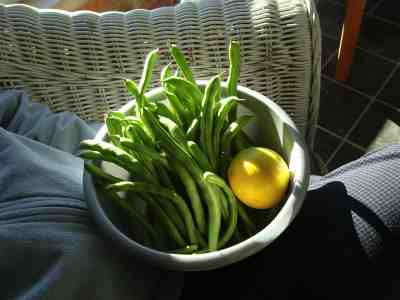
This page was last updated by Dr Bernard Preston on 15th September, 2024.
This mostly has to do with our attitude and a way of thinking about the sacred nature of our planet and society. It stands steadfastly against greed, and throwing anything in the trash that is not bio-destructible.
It will save you some money, perhaps, but require an investment of time.
The ten commandments of food security give us a reasonable assurance that we can still preserve the pristine nature of Mother Earth for our grandchildren.
That is seriously in doubt though until we tackle that hoary old chestnut concerning population explosion; even with the very best of food security we are going to run out of sustenance and water in the not too distant future.
- Give thanks for the food you eat.
- Eat food grown as close as possible to where you live.
- Strive for all people to have knowledge about and access to affordable and nutritious food.
- Eat mindfully and in moderation.
- Do not waste food.
- Be grateful to those who grow and prepare food for your table.
- Support fair wages for farm workers, farmers and food workers.
- Reduce the environmental damage of land, water and air from food production and the food system.
- Protect the biodiversity of seeds, soils, ecosystems and the cultures of food producers.
- Rejoice and share the sacred gift of food with all.
With thanks, and acknowledgement to Ncumisa Magadla, after her visit to the first ever eco-school held by the WCC in Blantyre.
Ten commandments of food security
Ten commandments of food security is a highly spiritual concept, but transcending the precepts of any one religion. At the heart of it is the belief that the world itself, and all its peoples are sacred; to be cared for and treasured, a gift to be handed on to the next generation.
The first commandment
Give thanks for the food you eat, is a stark reminder that three meals a day is a gift, and not a right; it is not something enjoyed by at least one in eight people in the world; in stark contrast twice as many people die from gluttony as from starvation.
It is a wonderful tradition, in acknowledgement that our daily bread is a gift, to give thanks at the beginning of each meal with reverence and thoughts for those who are hungry.
A wholesome meal is a sacrament; an outward sign of fellowship and food of an inner grace at work in our homes and bellies.
Give thanks.
The second commandment
The second commandment is inherent in what is known as backyard permaculture.
Eating food grown as close as possible to where you live, where feasible in your own garden, means it is fresh, the degradation from oxygen has barely begun and a vast amount of energy has not been used to get it to your kitchen, adding to your carbon footprint.
The whole concept of urban agriculture is something relatively new. Is it necessary that our lettuce and kale, avocados and citrus must be imported from Brazil or Israel?
You may also have some idea of what medium it has been grown in, and what has been sprayed on the plant, knowing local custom.
Fresh food from the local farmers' market also means that you will not take it home in a plastic bag contributing yet more to the gross pollution of our planet. Grabbing a basket to take with you when you go shopping is surely not that difficult.
Blue Zone people get much of their food from their own gardens; does living to a ripe old age with your marbles and joints intact attract your attention?
There are some foods that you must either grow yourself, or accept that you must avoid them. Broad beans are one such example; old and starchy they are simply awful. But reaped from your own garden, shelled and dropped into boiling water within an hour, they are simply terrific. They also happen to be the richest source of vegetable protein.
The third commandment
Strive for all people to have knowledge about and access to affordable and nutritious food; the third commandment places the responsibility on the shoulders of each and every one of us. What could you do?
Plenty if you have a heart for the poor and a desire to to enjoy nutritious choice food.
There are three points raised in the third commandment; knowledge, and affordable and nutritious food.
The first is to spread the word to those less well informed about the dangers of refined food, if you can call it that. By steadfastly refusing to eat white bread and margarine, or drink colas loaded with either sugar or saccharine, we are making a statement.
Refined mealiemeal from corn, white rice, with sugar close behind, are the villains of the piece in South Africa. Stripped of their vitamins and minerals and devoid of fibre they are the chief cause of obesity.
It is impossible for you and me, the man in the street, to make affordable and nutritious food available to all and sundry, but we can start with ourselves and any widows in our vicinity. It is our experience that we can make a 100% wholemeal loaf in our own home for half the price of the refined bread sold in the supermarket.
When those around us see that we make a serious effort to eat only nutritious meals, and spurn that sold in the name of food in the supermarkets, they may slowly get the message; but the headlong rush of the suicide machine may prove impossible to stop.
The truth is that nutritious food is far more affordable than the highly refined and processed 'food' promoted by manufacturing companies. Why have Wheatbix or Cornflakes for breakfast when it costs double a slice of wholemeal bread, and has a quarter of the nutrition?
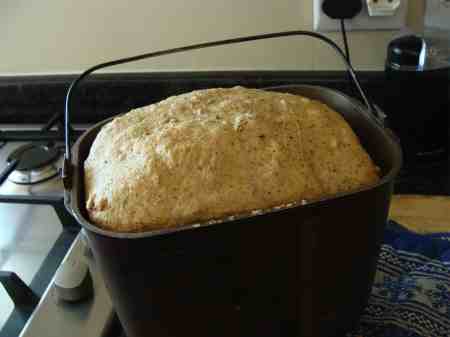
For those of us who get a bellyache, bloating or diarrhoea from from bread there is a solution; learn more from the meaning of gluten.
Newsletter
Our newsletter is entitled "create a cyan zone" at your home, preserving both yourself and Mother Earth for future generations; and the family too, of course. We promise not to spam you with daily emails promoting various products. You may get an occasional nudge to buy one of my books.
Here are the back issues.
- Lifestyle and ideal body weight
- What are ultra-processed foods?
- Investing in long-term health
- Diseases from plastic exposure
- Intensive lifestyle management for obesity has limited value
- A world largely devoid of Parkinson's Disease
- The impact of friendly bacteria in the tum on the prevention of cancer
- There's a hole in the bucket
- Everyone is talking about weight loss drugs
- Pull the sweet tooth
- If you suffer from heartburn plant a susu
- Refined maize meal and stunting
- Should agriculture and industry get priority for water and electricity?
- Nature is calling
- Mill your own flour
- Bake your own sourdough bread
- Microplastics from our water
- Alternative types of water storage
- Wear your clothes out
- Comfort foods
- Create a bee-friendly environment
- Go to bed slightly hungry
- Keep bees
- Blue zone folk are religious
- Reduce plastic waste
- Family is important
- What can go in compost?
- Grow broad beans for longevity
- Harvest and store sunshine
- Blue zone exercise
- Harvest and store your rainwater
- Create a cyan zone at your home
The fourth commandment
Eat mindfully and in moderation is the fourth of the ten commandments of food security. If any one thing characterises this generation, it is that we shovel our meals down our gullets with our minds totally elsewhere; thoughts of what it tastes like, with the latest soap blaring, flipping through the Face Book pages on the smartphone, and whether it promotes or detracts from our well-being are far from us.
Eat mindfully, savouring the flavour of each mouthful and chewing it thoroughly; that is what teeth are for.
This modern fast food that masquerades for the real thing, makes us constipated and obese; and we are so unmindful of the fact that we do not even notice. Nor do we care. Only when sickness forces us to focus on what we are doing to our bodies, do we wake up; only pain do we obey.
The first step is to studiously avoid the "all you can eat" restaurants; they were established by the Devil, intent on shortening our lives and creating Hell on Earth.
Taking a short walk after supper reduces the "dawn effect" that is associated with a 40 - 50% increased risk of stroke and heart attack.
The fifth commandment
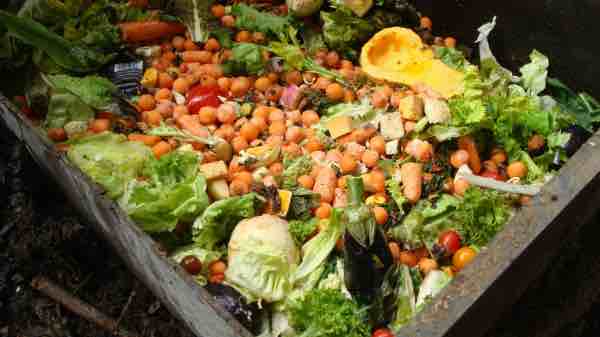
Do not waste food. About a third of the food grown for human consumption is lost along the way. Many a slip twixt cup and lip, in the voice of the bard. The fifth of the ten commandments of food security is very clear; wasted food is a sin. Above you can see that which has been scrounged from the greengrocer; millions of starving people would have loved to eat it, but through mismanagement it is wasted; I managed to secure it for our worms; disgraceful.
We obviously have little control over what happens in the supermarket, and what is spurned by authorities because it does not quite fit the bill, but we can make certain that next to nothing is discarded from our homes. It does take a little effort to manage the refrigerator properly, and what is in the larder; and discipline by buying only what we can eat.
The race to end waste begins in the home. I take it a step farther by getting involved in Second Harvest, an unpleasant business when it means sorting the greengrocer trash, but a huge amount of food destined for the dump is rescued and fed to our worm farms and hens; much would be perfectly good for the poor too.
The wonder of worm farms consumes me, not only because it provides liquid manure for our veggies, and also a vital source of protein for our hens. The latter are really one of the alien invasive species and would denude our land of earthworms; instead they get the wrigglies called Fetida from the farms. It is also a passion because it's my tiny contribution to sort and help us wean off plastic.
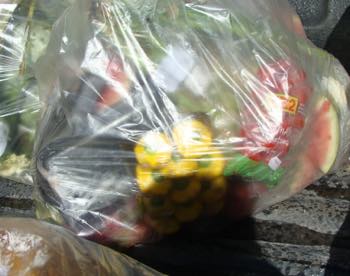
The sixth commandment
Be grateful to those who grow and prepare food for your table is the sixth of the ten commandments of food security, obviously allied to the first. It behooves us to honour those who make it possible to enjoy the bounty of three meals every day; we dare not take it for granted with over a billion hungry people on the planet.
One way to do that is to grow our own food, and give from our surplus to those in need. Right now we have an abundance of spinach; oh, to find a way to get it to the eight million children who go blind every year from a vitamin A deficiency.
The health benefits of spinach is not rocket science. It is so easy to grow. Preparing its first cousin using these recipes for Swiss chard makes it so easy to make tasty meals.
Kale is perhaps even better because of its lutein content; vital to prevent macular degeneration and cataracts.
Know the four vitamins that prevent the progressive march of frailty syndrome like the back of your hand; three of them are water soluble and must be consumed daily from our food; researchers found that from supplements they were far less effective[1].
The seventh commandment
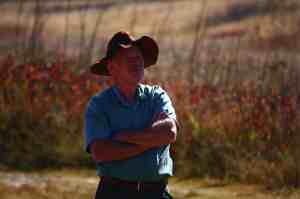
Support fair wages for farm workers, farmers and food workers is the seventh commandment.
I recently spent two weeks staying with my brother in the Dominican Republic; helping him reap coffee beans I soon realised that it is an arduous and thankless business. The same is true of tea. Farm workers are so badly paid that many now would rather not labour at all than for the extremely low wages; our beverage resources are seriously threatened.
More than a half of commercial farmers have been deprived of their land, or murdered in South Africa; our country has been turned from the bread basket of the region into an importing nation. We are witnessing a tragedy unfolding and food riots are waiting in the wings.
Farm workers have lost their jobs and many of those remaining are still appallingly paid; the ten commandments of food security is a complex subject concerning us all.
The permanent and irreversible stunting of children should bring shame to our heads, but we are not in the slightest concerned it would seem. It starts in utero and continues with the newborn as unscrupulous food companies persuade mothers that unaffordable formula is what their babes need.
Then it continues as yet other food companies refine the goodness out of grains, which goes to feed the pigs, and our children are left with the dross. Why were cornflakes invented?
The eighth commandment
Reduce the environmental damage of land, water and air from food production and the food system is the eighth of the ten commandments of food security.
This is a complex subject but I will highlight a few of the many problems.
Animal farming for meat and dairy production produces a large amount of nitrogenous hydrocarbon gases that are released into the atmosphere increasing the greenhouse effect. Disposal of manure and urine needs to be carefully managed, and limited. The only action that the man in the street can meaningfully undertake is to eat more legumes for protein. Chickpeas, beans and green peas, lentils and tofu are the future for those wishing to be part of all ten commandments of food security.
Nature is calling; but do we have ears to hear?
Find the links to those topics highlighted in bold like lentil protein above by copying and pasting into the Site Search function in the navigation bar above.
This green bean and lentil soup is a joy for all want to supplement their meat with vegetable protein.
The runoff of inorganic fertilisers into our water systems is causing huge problems and certainly needs to be controlled to keep our streams and rivers pristine. Holland is probably the foremost country in the world ensuring that animal waste and fertiliser do not end up in our dams; traveling the highways and byways one becomes accustomed to the smell of urine as tankers spray it on the lands.
Another is the
indiscriminate use of pest and herbicides like glyphosate, or Roundup.
It is a pernicious chemical known to cause neoplasms and is almost certainly
the main cause of the demise worldwide of the honeybee. It is
frightening that farmers spray the chemical on plants just before they
harvest of potatoes and wheat and many other produces, and we cannot
avoid getting our share in our food.
Every third or fourth mouthful that we enjoy is pollinated by bees; how to start beekeeping is a subject close to my heart.
Each and every one of these ten commandments of food security are important if we do not want our grandchildren dancing on our graves and cursing the day we were born; are we totally ruining it for them by rapacious living?
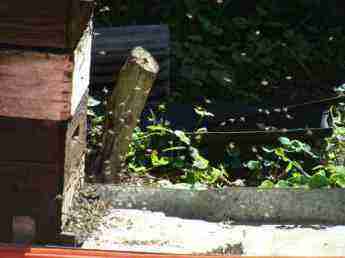
The ninth commandment
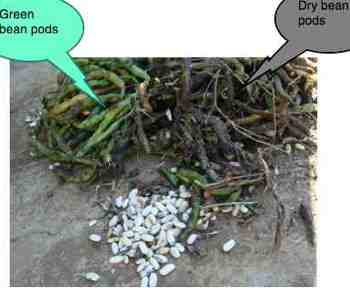
Protect the biodiversity of seeds, soils, ecosystems and the cultures of food producers is the ninth of the ten commandments of food security.
Large seed companies are making it more and more difficult to get seed of old cultivars, wanting us rather to purchase their very expensive genetically modified brands; enough said.
The soils and ecosystems of our world are fragile, witness the wholesale destruction of our forests and oceans. The pristine holidays that we take for granted are seriously threatened and will not be the pleasure of our grandchildren unless each every person gets involved. Getting your garden soil ready for planting is actually a holy business; it sequesters carbon from the atmosphere.
For example, our favourite bean, the Witsa can no longer be easily bought; but by keeping back a portion of the harvest each year, we still have abundant green beans; save bean seeds takes little time or energy.
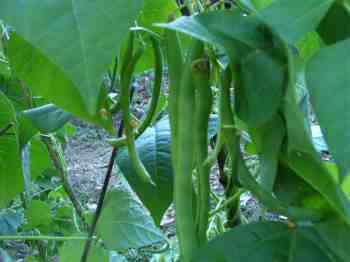
The tenth commandment
Rejoice and share the sacred gift of food with all; that's the last of the ten commandments of food security. It reminds us that there really is sufficient food for all. If we stopped wasting, killing ourselves with excess and shared there would be more than enough to go around.
When browsing use right click and "Open Link in New Tab" or you may get a bad gateway signal.
Did you find this page interesting? How about forwarding it to a friendly book or food junkie? Better still, a social media tick would help.
- Bernard Preston homepage
- Compost
- Ten Commandments of Food Security
Address:
56 Groenekloof Rd,
Hilton, KZN
South Africa
Website:
https://www.bernard-preston.com